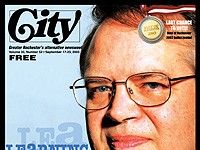Learning curve
School board member Rob Brown on standardized tests, school quality, and district cronyism
By Ron Netsky[
{
"name": "500x250 Ad",
"insertPoint": "5",
"component": "15667920",
"parentWrapperClass": "",
"requiredCountToDisplay": "1"
}
]
Over the last three decades, attorney and school board member Rob Brown has served on the boards of dozens of arts, cultural, and civic organizations. Even Rochester Mayor William Johnson, who often differs with Brown on school district matters, calls him "a rare person, a public servant."
Many disagree with Brown's positions on issues, but few doubt his sincerity. Especially when the subject is urban education. His sons graduated from Rochester city schools and his wife teaches at East High School.
Strong willed and opinionated, Brown is popular with many voters --- and is a controversial topic among some important Democrats. Brown's support of former Schools Superintendent Clifford Janey drew sharp criticism from Mayor Johnson. So has his insistence that the school district needs more money. (Countering Johnson's phrase that the district must "live within its means," Brown responds: "The means must cover the needs.")
As part of our 2003 election coverage, City interviewed Brown recently on a variety of issues facing the school district, including parental involvement, middle-income flight from the city, and School Board and administrative oversight in the district. In this week's installment, we begin by asking Brown about the current emphasis on testing.
City:Across the country, as George Bush insists on more testing, many people have said teachers are teaching to the test, often at the expense of real education.
Brown: I have been told, but I don't know because I am not an educator --- and I dare say most of the commentators on this issue do not know --- that the Regents level tests in New York and many other states, because of the requirement that people explain their work, make it very difficult to teach to the test.
If teaching to the test means you work with a set of educational principles, that, for example, in writing, assume you have a subject, assume you have a paragraph structure that's appropriate, assume you have a sentence structure, then I think you're going to learn when you "teach to that test." What has happened is the resistance to high-stakes testing, which I think is in part a natural outcome of the fact that most of us don't like to compete with one another.
This is argued rhetorically by talking about things like "teaching to the test." The quality of education, at least in our school system, is very high. It's very hard for a teacher to teach to the test. I think the Regents tests, as we saw with the Math A and Physics tests, need to be more closely aligned with the curriculum.
City:The state doesn't seem to want to face the fact that the tests are out of sync. I know one official resigned...
Brown: Somebody was sacrificed.
City:But the head of education, Commissioner Richard Mills, doesn't want to take responsibility for it. Apparently the Physics exam was so difficult that some students around the state are choosing not to take Physics because it might ruin their averages.
Brown: Isn't that silly? You have something wrong when that's the case. It has to be the case that either the test is not aligned to the curriculum or the grading does not appropriately reflect the abilities of the child who takes the test. In either case the answer is easy: You have to align the test to the curriculum or make sure that your grading is done reasonably. I don't think that argues for wholesale rejection of Regents testing.
I also don't think there's any particular reason to embrace high-stakes testing as a panacea to educational issues. It's a clever ruse by this non-education-oriented administration in Washington to try to limit the amount of money they put into education by knocking schools off that don't perform.
City:Are public hearings on things like the Regents tests truly public hearings or are they, in effect, an opportunity for district insiders to talk?
Brown: One of the things about public hearings that you discover quickly when you're in public life is that the people who show up are either running for some office and want to pontificate, or they're people on extreme sides of the issue. It's not very likely that the single parent holding down two jobs and trying to cook dinner in between them for her children before she delivers them to their grandmother to take care of them is going to have the time to go to a hearing for the sake of either putting in a moderate comment or intellectual enlightenment. I think hearings are a legitimate attempt by public officials to hear what people have to say.
City: How important is it to maintain art and music programs at a time of budgets cuts?
Brown: I would answer by asking another question. Why is it that a poor child in the city shouldn't have art and music?
City: If the budget must be balanced what programs can be cut?
Brown: I prefer not to think of budgets in broad categories. I think what we need to do to deal with the budget crisis that the Bush-Pataki economy has forced on us is to look at the individual year and to try to figure out how to deal with that year. We don't have the ability to provide multi-year budgeting because there is, in fact, no educational formula in New York. It's all made up after the legislature decides how much money you're going to get in its negotiations with the governor. That makes for a totally ad-hoc process where you have to look at budgeting year by year.
City:You've talked about the right of students to a "Brighton-quality education." How do we achieve that?
Brown: First we have to galvanize community resources to help us improve the level of parenting. Then we have to make our instructional programs more rigorous than they are anywhere else, so we can help to overcome more of the effects of grinding poverty and attitudes that do not seek to exploit the system. We have to convince our families and our children that they have a 12-year period that we're giving them free of charge to suck everything out of Western civilization that they can use. And I say Western civilization because that's what works in the economic and social mainstream of the United States of America.
City: Does your emphasis on Western civilization mean you are not a believer in multiculturalism?
Brown: I am absolutely for multicultural education. I think one of the most important trends in the US has been the accommodation, the acceptance, and embracing of cultures of all nations. It's what makes this country strong. It's what makes us a powerful economic leader in the world. The fact that we are able to adapt better than other people to other cultures is one of the greatest strengths of the US.
City:Do you have any ideas about how to keep middle and upper-income families from fleeing the city school district?
Brown: Not all of them do. My kids went through city schools. My kids had friends. They stayed and a lot of them are middle class and upper-middle class people, and there are an awful lot of highly educated people who have their children in city school because they believe that's what's best for them, which is what we did.
We need to show people that the education in the city is superior. We made that decision and our children have been very successful. What we have to do is confront the issues of racism and classism that foster the situation that many people do not wish to go to school with black and Hispanic and poor kids. I think that's what's at the root of this; I don't think you're talking about an inadequate school system.
City:I want to ask a few questions about accountability. When people see a story in the paper, like the one about the approval of tenure for a teacher involved with drugs, what are they to think about the oversight of the district?
Brown: They think we're incompetent. But, we corrected it. If it happened at Kodak nobody would ever hear of it.
City:So, it's a big enough system that occasionally something will go wrong?
Brown: Of course. And it's more fun to write about something like that than to think about what you're writing.
City:Do poor performers get shuffled into administrative positions instead of fired?
Brown: One of the issues that we deal with in the district is uniquely difficult: the issue of tenure and union rights. In most businesses in New York employees are "at will," so somebody can come in and say, congratulations, this is your last day. Here's your gold watch or not. In organizations where almost all of the people are covered by collective bargaining and covered by state tenure requirements, it becomes significantly more difficult to deal with personnel issues in a summary or efficient fashion. One of the trade-offs of a system that protects people is it makes the system less efficient.
City:Within that system, can more be done to ensure quality?
Brown: When Shirley Thompson became president of the board and Joanne Giuffrida became head of human resources for the city school district, we ended up with the very best people in both jobs. Joanne Giuffrida is one of the most talented, professional HR administrators I have ever met. She comes to the job with experience as HR director of the County of Monroe and the Rush Henrietta School District. So she knows both large governmental organizational issues and school district issues, and I am confident that as she assembles her team, we will end up with an HR department that, within the limits of human accuracy, will deal with HR issues in an appropriate and effective manner.
I don't know what else I can say. We've got a lot of employees, and some of them get it wrong sometimes and then their supervisors also get it wrong sometimes.
City:Over the years there have been allegations of cronyism in the district --- keeping positions open for friends.
Brown: I think it happens. The book Impossible Job that Howard Fuller put together [about the difficulty of being a superintendent] talks about employment being one of the big issues in urban education, and I don't think our district is terribly different. I think it's a natural danger in political systems. I don't think it's an unavoidable problem. I think it's something that we can, in fact, deal with.
City:Is the board overworked? Is it involved in too much?
Brown: Yes.
City:Could the workload be reduced?
Brown: Yes.
City:How do you go about getting more people to care about education?
Brown: You have to mount a continuous, unremitting, informational, educational, and experiential campaign that brings people into contact with other individuals so they can view them as people.
The most difficult thing in convincing people outside the city to support Rochester city schools is the Us vs. Them culture that provides so much of the fodder for the daily press. As long as you can keep saying, "Look what those horrible others did, aren't we glad we are not anywhere near them?" and say that with impunity, without having people be introduced to the others as human beings, I think you are going to suffer that problem.
Speaking of Rob Brown
-
After the vote: the shock of the Red and the Blue
Nov 10, 2004 -

City school district tackles the budget --- again
Aug 25, 2004 -

Learning curve
Sep 17, 2003 - More »
Latest in News
More by Ron Netsky
-

Album Review | 'Bizet: Carmen in Jazz'
Mar 26, 2024 -
'To Swing Is the Thing" by Mike Melito
Aug 10, 2023 - More »




